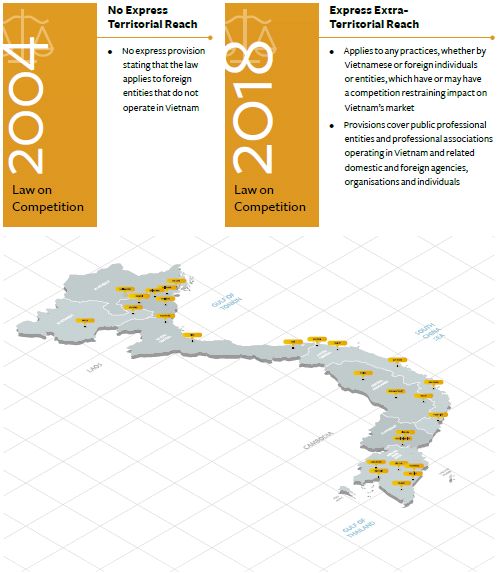Introduction
Vietnam's competition law is poised for big changes as the new 2018 Law on Competition comes into force from 1 July 2019. It is critical for businesses already operating or considering investing in Vietnam to understand this evolving regulatory environment. This guide provides such an overview, and covers the key differences between the 2004 Law on Competition and the 2018 Law on Competition.
The guide was originally conceived as a Mayer Brown monthly periodical in late 2018 – the "Vietnam Competition Law Series" – in response to client demands for further clarity and guidance regarding the new competition law regime in Vietnam. This booklet is the culmination of the process, and consolidates the four issues in the series into an easy reference source.
This guide is presented in a simple and accessible manner, and is intended as a useful reference tool for businesses and in-house counsel to have a quick understanding of Vietnam Competition Law. It is, however, not meant to be a substitute for legal advice. Please contact us for assistance on specific matters you may have that touch on competition law in Vietnam.
About Mayer Brown's Antitrust and Competition Practice
Mayer Brown's Asia Antitrust and Competition practice is one of the leading providers of legal services relating to local and cross-border competition work in Asia. We have a dedicated team of antitrust and competition lawyers who are experienced in providing commercial advice relating to competition law regimes in Hong Kong, China, Vietnam and beyond.
Our team is regularly recognized as one of the leading practice in international ranking publications like Chambers and Partners, IFLR and Legal 500. Most recently, it has also been recognized as one of the top 25 competition practices globally in GCR's Global Elite Practice rankings.
Whom Does it Cover?
The 2004 Law on Competition applies to organisations and individuals conducting business (collectively known as 'enterprises'), enterprises conducting business in State monopoly industries and sectors, and foreign enterprises operating in Vietnam. It also covers industry associations operating in Vietnam. There are no express provisions stating that the law applies to foreign entities that do not operate in Vietnam.
The 2018 Law on Competition expressly expands the provisions to have extra-territorial reach by covering all practices which have or may have a competition restraining impact on Vietnam's market. It also expands the entities covered to expressly include public professional entities and professional associations operating in Vietnam, and related domestic and foreign agencies, organisations and individuals.

Competition Regulator
The 2004 Law on Competition adopts a dual agency system to investigations and enforcement – the Vietnam Competition and Consumer Authority (VCCA) and the Vietnam Competition Council (VCC).
The VCCA was known as the Viet Nam Competition Administrative Department when the agency was first established under the 2004 Law on Competition, before being renamed the Vietnam Competition Authority (VCA). In August 2017, the VCA was restructured into two agencies – the VCCA (having competition and consumer protection functions) and the Viet Nam Trade Remedies Authority (having trade remedies functions).1
The VCCA is constituted under the Ministry of Industry and Trade, and is responsible for:
- investigating (but not adjudicating) cases relating to restraint of competition (i.e. restrictive agreements, abuse of dominance, merger control);
- investigating and adjudicating cases involving unfair competitive practices; and
- assessing requests for exemption from restrictive agreements and merger control provisions, and preparing recommendations to the Ministry of Industry and Trade or the Prime Minister on the same, for them to take a final decision.
Where the VCCA considers that there is sufficient evidence of an infringement, it will refer the case to the VCC, which is responsible for hearing and adjudicating restraint of competition cases.
Under the 2018 Law on Competition, the two agencies will be consolidated into one – the National Competition Commission (NCC) – which will have the role of both investigating and adjudicating cases involving restraint of competition and unfair competitive practices. The Competition Case Investigation Agency will be established within the NCC to carry out investigations.2 While there had previously been some discussions about constituting the NCC as an independent competition authority,3 the decision was finally made to place the NCC under the Ministry of Industry and Trade.4 Some concerns have been raised that constituting the competition regulator as an agency under the Ministry of Industry and Trade may affect its independence and impartiality, especially vis-à-vis state-owned enterprises.5
Footnotes
1 OECD, OECD Peer Review of Competition Law and Policy: Viet Nam (2018)
2 PaRR, Vietnam's amended competition law offers no mitigation for abuse of dominance, monopoly conduct - Asia Competition Law Forum (4 July 2018)
3 PaRR, Vietnam's independent competition authority to see less political interference, official says (20 July 2017)
4 PaRR, Vietnam competition regime to introduce competition test in amended law, official says (18 May 2018)
5 OECD, OECD Peer Review of Competition Law and Policy: Viet Nam (2018)
Visit us at mayerbrown.com
Mayer Brown is a global legal services provider comprising legal practices that are separate entities (the "Mayer Brown Practices"). The Mayer Brown Practices are: Mayer Brown LLP and Mayer Brown Europe – Brussels LLP, both limited liability partnerships established in Illinois USA; Mayer Brown International LLP, a limited liability partnership incorporated in England and Wales (authorized and regulated by the Solicitors Regulation Authority and registered in England and Wales number OC 303359); Mayer Brown, a SELAS established in France; Mayer Brown JSM, a Hong Kong partnership and its associated entities in Asia; and Tauil & Chequer Advogados, a Brazilian law partnership with which Mayer Brown is associated. "Mayer Brown" and the Mayer Brown logo are the trademarks of the Mayer Brown Practices in their respective jurisdictions.
© Copyright 2019. The Mayer Brown Practices. All rights reserved.
This Mayer Brown article provides information and comments on legal issues and developments of interest. The foregoing is not a comprehensive treatment of the subject matter covered and is not intended to provide legal advice. Readers should seek specific legal advice before taking any action with respect to the matters discussed herein.

